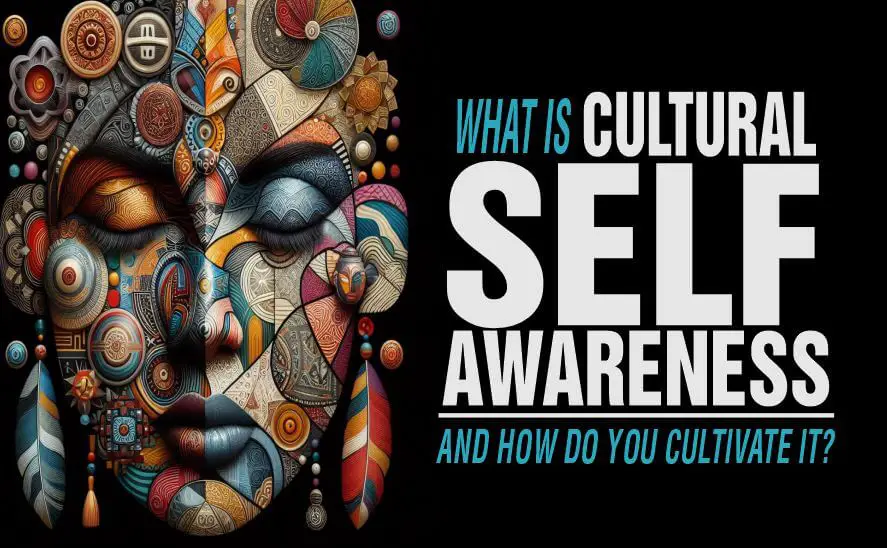Cultural self-awareness reveals how your values, beliefs, and biases shape your interactions, helping you connect authentically, communicate clearly, and build stronger relationships across diverse environments.
In a globalized world, your cultural self-awareness shapes how you relate to others and navigate diverse perspectives.
Understanding your own cultural background, values, and biases gives insight into how these factors influence your thoughts, behaviors, and communication.
This awareness helps you connect genuinely with people from different backgrounds and interact effectively in social and professional settings.
Cultural self-awareness asks you to reflect on the beliefs and habits formed by your upbringing.
Recognizing these influences allows you to identify biases that may affect how you perceive and respond to others.
Cultivating self-awareness in cultures is crucial for promoting empathy, effective communication, and building inclusive environments in our diverse society.
What is Cultural Self-awareness?
Cultural self-awareness, different from cultural awareness, is knowing your own cultural background, values, and beliefs, and understanding how they shape your behavior and interactions.
It helps you recognize personal biases and how they influence the way you communicate or respond to others.
By being aware of your cultural lens, you can engage more thoughtfully, avoid misunderstandings, and build stronger connections with people from different backgrounds in both personal and professional settings.
The Importance of Cultural Self-Awareness
Understanding your own cultural identity is key to connecting meaningfully with others.
Here are the importance of being aware of your own culture:
Improved Empathy and Understanding
By knowing your cultural lens, you can better appreciate perspectives that differ from your own.
This awareness allows you to listen actively, respond thoughtfully, and approach conversations with sensitivity.
In work or social settings, this mindset strengthens relationships, encourages collaboration, and reduces conflict by valuing each person’s experiences and beliefs.
Enhanced Collaboration and Teamwork
When you recognize your cultural influences, you can interact with diverse teams more effectively.
Understanding your habits and thought patterns helps you adjust your approach, respect differing viewpoints, and contribute to inclusive decision-making.
Teams with culturally self-aware members experience smoother communication and more innovative problem-solving.
Building Authentic Connections
Being aware of your cultural background allows you to engage in genuine conversations.
You can reveal shared values, demonstrate understanding, and connect on a deeper level.
This authenticity builds trust, encourages cooperation, and encourages meaningful relationships across social, professional, and global contexts.
Reducing Bias and Misunderstandings
Cultural self-awareness helps you identify and manage unconscious biases.
By reflecting on your assumptions, you can prevent misjudgments, communicate more clearly, and navigate diverse interactions with sensitivity and respect.
This leads to better outcomes and stronger interpersonal connections.
Related Posts
How Emotions Control Your Existence
10 Signs You Lack Self-understanding
Core Components of Cultural Self-Awareness
Understanding yourself is the first step to connecting effectively with people from different backgrounds.
Cultural self-awareness helps you recognize how your values, beliefs, and behaviors shape interactions.
By examining your thoughts and reactions, you can communicate more clearly, reduce misunderstandings, and build trust across social, professional, and global contexts.
Recognizing Personal Values and Beliefs
Your values and beliefs guide how you make decisions and interact with others.
By identifying what matters most to you, you can understand why you respond in certain ways.
This awareness helps you respect differing perspectives, communicate thoughtfully, and create stronger connections with people from diverse cultural backgrounds.
Identifying Biases and Assumptions
Everyone carries biases shaped by upbringing, culture, and life experiences.
By reflecting on your assumptions, you can prevent them from influencing how you perceive others.
Awareness of these biases allows you to approach interactions with openness, reduce misunderstandings, and foster mutual respect in personal and professional settings.
Understanding Communication Styles
You express yourself in ways influenced by your cultural background.
Some people prefer direct communication, while others value subtlety or context.
Recognizing your style and observing how others communicate helps you adapt effectively.
This awareness reduces miscommunication and allows for smoother, more respectful exchanges across diverse cultural contexts.
Emotional Awareness and Regulation
Your emotions affect how you react in cross-cultural situations.
By noticing your emotional responses and learning to manage them, you can stay calm, listen attentively, and respond thoughtfully.
This skill helps you navigate cultural differences, resolve conflicts respectfully, and maintain meaningful, productive interactions with people from varied backgrounds.
Recognizing Biases and Stereotypes
Understanding your biases and stereotypes is a vital step in developing cultural self-awareness.
These hidden attitudes shape how you perceive people from different backgrounds and can influence your interactions in personal, social, and professional settings.
By noticing these patterns, you can reflect on how your upbringing, experiences, and environment shape your thinking.
Awareness allows you to question assumptions, adjust your perspective, and engage more thoughtfully with others, improving communication and relationships.
Biases: How They Shape Your Perspective
Your biases are unconscious attitudes that guide your judgments about people or groups.
They often form from early experiences, social influences, and repeated exposure to media messages.
By recognizing these internal tendencies, you can prevent them from clouding your interactions.
Being aware of your biases allows you to respond thoughtfully rather than react automatically, helping you create fairer and more respectful relationships across different cultures.
Stereotypes: How They Affect Your Understanding
Stereotypes are generalizations you may hold about cultures, groups, or behaviors.
They can lead to misconceptions, unfair assumptions, and misunderstandings in your interactions.
By noticing these mental shortcuts, you can challenge their influence and adopt a more open and inclusive mindset.
Reflecting on stereotypes encourages curiosity, empathy, and thoughtful communication, allowing you to engage more authentically and connect meaningfully with people from diverse cultural backgrounds.
Impact of Culture on Perceptions and Interactions

Culture plays a significant role in shaping your self-awareness in cultural perceptions and interactions.
Here are some impacts of culture on perceptions and interactions:
1. Communication Style
Different cultures have distinct communication styles, varying in directness, assertiveness, and non-verbal cues. Some value explicitness, while others prefer subtlety.
These differences can cause misunderstandings, impacting how people perceive and interact with each other.
2. Social Norms and Values
Cultural norms and values influence your perceptions and interactions by providing a framework for what is considered appropriate or acceptable behaviour.
For instance, in some cultures, speaking loudly or interrupting others may be perceived as rude, whereas in others, it may indicate engagement and enthusiasm.
These differences can impact how individuals perceive and respond to each other in social interactions.
3. Stereotypes and Biases
Culture can shape your perceptions of others by influencing the formation of stereotypes and biases.
Stereotypes are simplified, generalized beliefs about a particular group of people, and biases are preconceived notions or prejudices that can affect how you might perceive and interact with others.
These stereotypes and biases can stem from cultural traditions, beliefs, or media portrayals, and can negatively impact intercultural interactions.
4. Non-verbal Communication
Non-verbal cues, such as eye contact, body language, and gestures, vary across cultures.
For example, direct eye contact is seen as a sign of confidence and respect in some cultures, while it can be seen as confrontational or disrespectful in others.
Understanding these differences in non-verbal communication is crucial for cultural self-awareness, effective cross-cultural interactions, and avoiding misunderstandings.
5. Power Distance
Power distance refers to the extent to which you accept and expect power differences within a society.
It affects how you perceive and interact with authority figures and people of higher or lower social status.
In cultures with high power distance, you may show more deference and respect to authority figures, while in cultures with low power distance, you may have more equal and informal interactions with authority figures.
6. Cultural Context
Cultural context is the underlying cultural values and assumptions that influence the interpretation and meaning of events or behaviours.
For example, individualistic cultures value independence, personal achievement, and self-expression, while collectivist cultures prioritize harmony, group cohesion, and social obligations.
These cultural contexts influence your perceptions of yourself, others, and social interactions.
Developing Cultural Self-Awareness
Understanding yourself in relation to your culture helps you connect better with others.
Developing cultural self-awareness allows you to see how your values, beliefs, and biases influence interactions.
By practicing intentional strategies, you can communicate more clearly, listen more deeply, and engage with people from diverse backgrounds in a meaningful and respectful way.
Self-Reflection
Take time to examine your own values, beliefs, and assumptions.
Journaling or quiet reflection helps you see how your cultural background shapes your behavior.
By recognizing biases and habitual responses, you can respond thoughtfully, challenge preconceived notions, and build stronger, more respectful connections with people from different cultural perspectives.
Education and Learning
Seek knowledge through books, media, workshops, or cultural events.
Engaging with different perspectives deepens your understanding and appreciation of diverse values.
Respectful conversations and curiosity allow you to learn about others’ traditions, reducing stereotypes and increasing empathy.
This approach enriches your interactions both socially and professionally.
Empathy and Listening
Listen actively to others’ experiences without judgment.
Developing empathy helps you understand how culture shapes their perspective.
By paying attention, asking questions, and validating their experiences, you can strengthen relationships, build trust, and create inclusive environments where everyone feels respected and understood.
Embrace Cultural Differences
Notice and value differences in customs, traditions, and beliefs. Avoid comparing or judging cultures.
Recognizing the richness of diverse perspectives allows you to appreciate alternative ways of thinking and behaving.
This mindset encourages curiosity and respect, helping you engage authentically with people from varied backgrounds.
Engage in Intercultural Experiences
Participate in travel, volunteering, or cultural exchange programs.
Experiencing other communities firsthand helps you understand daily life, customs, and communication styles.
Immersion promotes empathy and cultural insight, allowing you to build meaningful connections and adapt to social or professional settings with greater awareness and respect.
Overcome Linguistic Barriers
Learning another language bridges communication gaps and gives insight into cultural norms.
Even basic proficiency demonstrates respect, strengthens connections, and deepens understanding of the people you interact with, allowing conversations to flow more naturally while avoiding miscommunication.
Cultivate Open-Mindedness
Approach cultural differences without stereotypes or judgment.
Question your assumptions and be willing to adapt your perspective.
Open-mindedness helps you engage thoughtfully with diverse viewpoints, respond respectfully to unfamiliar customs, and build trust with people from various cultural backgrounds.
Practice Cultural Sensitivity
Respect the customs and practices of others by observing and adjusting your behavior.
Being aware of cultural expectations in communication, gestures, and etiquette shows respect.
Mindful adaptation strengthens relationships, prevents misunderstandings, and helps you interact confidently across diverse cultural settings.
Challenges in Developing Cultural Self-awareness

Developing cultural self-awareness can feel challenging, but recognizing your biases and examining your cultural identity helps you connect more meaningfully with others.
Understanding these obstacles allows you to respond thoughtfully, improve communication, and strengthen personal and professional relationships in diverse environments.
Resistance to Examining Biases
You may feel uncomfortable confronting your own biases because they challenge long-held beliefs or trigger fear of judgment.
This resistance can block growth and prevent you from understanding different cultures.
When you engage in self-reflection exercises, journaling, or thoughtful discussions, you can examine your assumptions, identify hidden biases, and gradually adjust your mindset to interact more openly with people from diverse backgrounds.
Overgeneralization and Stereotypes
It is easy to assume your personal experiences represent an entire culture, but this leads to stereotypes and misunderstandings.
Recognizing the diversity within cultural groups helps you avoid this trap.
Approach learning with curiosity, focus on individual experiences, and ask questions.
When you do so, you gain a more nuanced understanding of cultures, improving empathy and the quality of your interactions.
Navigating Emotional Discomfort
Examining your cultural identity and privilege can stir guilt, defensiveness, or anxiety.
These feelings are normal, but ignoring them limits growth. Practice self-compassion and seek safe spaces for dialogue.
Engaging with supportive people or mentors allows you to process emotions, reflect on your behavior, and develop a balanced, respectful approach to cultural self-awareness.
Cultural Self-Awareness in Action
Cultural self-awareness helps you interact confidently in different social, professional, and travel settings.
When you understand your own cultural lens, you can communicate thoughtfully, respond with empathy, and build meaningful connections across diverse environments.
Workplace Collaboration
In the workplace, your awareness of personal biases and values shapes how you relate to colleagues.
Understanding that communication styles differ across cultures allows you to adapt, avoid misunderstandings, and support collaboration.
When you listen actively and respect different perspectives, you create a cooperative environment where team members feel valued and productivity improves.
Personal Relationships
Being aware of your cultural identity helps you connect more deeply with partners, friends, and family.
Understanding differences in values, traditions, and communication patterns allows you to respond thoughtfully, reduce conflicts, and build stronger, more inclusive relationships.
Open discussions about cultural perspectives strengthen trust and mutual respect.
Travel and Cross-Cultural Experiences
When you travel, cultural self-awareness allows you to interact respectfully with locals.
Learning local customs, greetings, or etiquette shows appreciation and helps you adapt comfortably.
By observing and adjusting your behavior, you create meaningful experiences, develop empathy, and form authentic connections while navigating new cultures.
Frequently Asked Questions
What is cultural self-awareness?
It is understanding your own cultural identity, biases, and assumptions, and promoting open-mindedness towards other cultures.
Why is cultural self-awareness important?
It promotes inclusivity, empathy, and effective communication in diverse environments, leading to respectful and harmonious interactions.
How can I develop cultural self-awareness?
Engage in self-reflection, seek diverse experiences, practice empathy, embrace cultural differences, and cultivate open-mindedness.
What are the challenges in developing cultural self-awareness?
Overcoming ethnocentrism, stereotypes, fear of the unknown, and lack of exposure to diverse cultural experiences are common challenges.
Conclusion
Cultural self-awareness, an art in itself, allows you to bridge barriers, sustain understanding, and navigate diversity with sensitivity and respect.
By developing this type of self-awareness, educating yourself about different cultures, and actively engaging in intercultural experiences, you can progressively cultivate self-awareness in cultures.
This heightened understanding nurtures empathy, curiosity, and a commitment to embracing the rich diversity of our global society.
Let us strive to be cultural ambassadors, cultivating a world where every individual is seen, respected, and celebrated for their unique cultural identity.
References:
- https://apps.dtic.mil/sti/citations/AD0765486
- https://extensionpublications.unl.edu/assets/html/g1375/build/g1375.htm
- https://www.researchbank.ac.nz/handle/10652/5363
Pious Clements is the insightful voice behind "The Conducts of Life" blog, where he writes about life ethics, self-development, life mastery, and the dynamics of people and society.
With a profound understanding of human behaviuor and societal dynamics, Pious offers thought-provoking perspectives on ethical living and personal growth.
Through engaging narratives and astute observations, he inspires readers to navigate life's complexities with wisdom and integrity, encouraging a deeper understanding of the human experience and our place within society.
